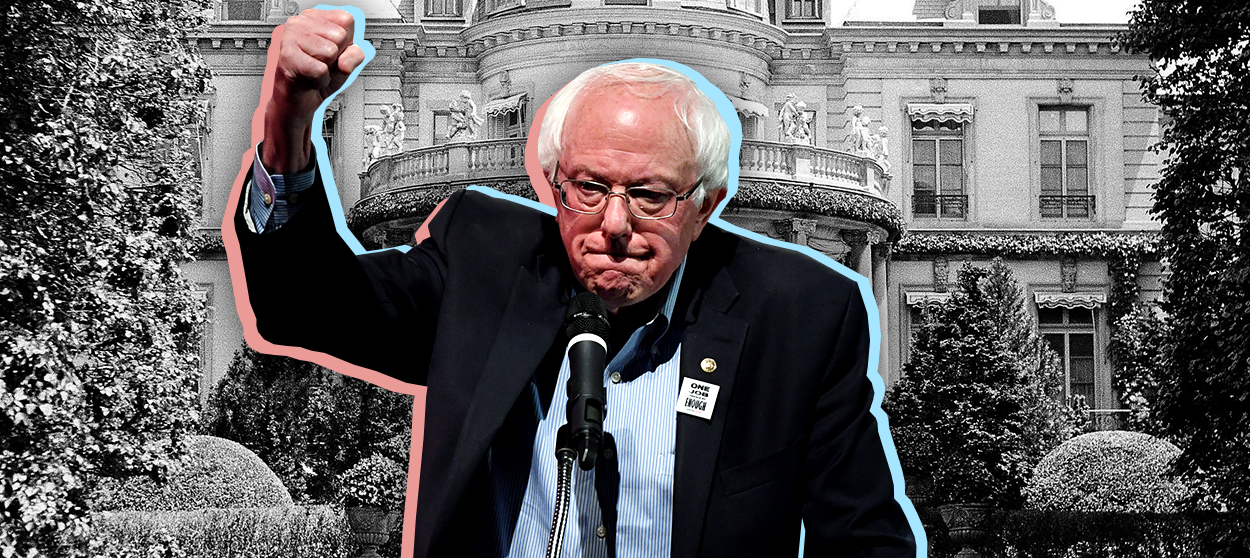The case for the estate tax
Here's why Bernie Sanders' latest proposal is as American as baseball and TV dinners


The tax policy content of the Democratic presidential race has been remarkably substantive — and remarkably populist, with all sorts of stiff new taxes on the rich proposed. Elizabeth Warren was first out of the gate with a shiny wealth tax, but Bernie Sanders has countered with a proposal to drastically toughen up and restructure the estate tax.
Thanks to the Trump tax cuts, the estate tax only applies to fortunes above $11.2 million — making only about 2,000 people eligible. Naturally, Republicans want to get rid of it entirely. Sanders, by contrast, would create three new estate tax brackets: 45 percent from $3.5-10 million, 50 percent from $10-50 million, 55 percent from $50 million to $1 billion, and 77 percent above that.
This is a great idea — and as American as baseball and TV dinners.
The Week
Escape your echo chamber. Get the facts behind the news, plus analysis from multiple perspectives.

Sign up for The Week's Free Newsletters
From our morning news briefing to a weekly Good News Newsletter, get the best of The Week delivered directly to your inbox.
From our morning news briefing to a weekly Good News Newsletter, get the best of The Week delivered directly to your inbox.
The most obvious justification for the estate tax is that it insulates America from oligarchy. Back in the mid-20th century when the tax was considerably steeper than even what Sanders is proposing, the share of wealth owned by the top 0.1 percent was less than half what it is today.
Of course, it takes more than an estate tax to keep inequality down. But preventing the steady accumulation of bigger and bigger dynastic fortunes (the Koch brothers, for example, inherited gigantic wealth from their father, as did President Trump) is an important component of any egalitarian policy mix. In particular, it bolsters the capital gains tax, which is only charged when an asset is sold. A big share of the largest fortunes consist of "unrealized" capital gains that have not been sold — thus making the estate tax a way to keep ever-growing dragon hoards from simply being passed down from generation to generation.
The other major argument in favor is that it would raise a ton of money. Sanders' team estimated that it would raise perhaps $2.2 trillion over a decade, though that's a very rough approximation. Whatever the number, it's certain to be sizable, and coming from the people with the greatest possible capacity to pay. Great!
So what about the contrary case? Conservatives have two main lines of attack. The first is simply shouting "death tax!" This is nothing but silly propaganda intended to suggest liberals like punishing people for dying, but it also illustrates a key point of political theory. It is metaphysically impossible to tax dead people, because they can no longer own anything on account of being dead. The estate tax is a tax on very rich heirs — that is, people like Donald Trump, Jr. Don't let Grover Norquist trip you up on this point.
A free daily email with the biggest news stories of the day – and the best features from TheWeek.com
The more buttoned-down argument is that the estate tax will harm growth. Conservative economists have cooked up a variety of picture-book models in which growth depends on capital accumulation, so taxes on wealth are supposed to be the worst kind. But there is very little evidence for this, especially for a wealthy country like the U.S. On the contrary, as Noah Smith writes, some research suggests that taxes on wealth might actually improve growth by breaking up "unproductive capital for more productive uses." Indeed, growth was much higher during the estate tax heyday in the mid-20th century. (As a general matter, though, countries do not become rich through One Weird Trick.)
In any case, if we are really concerned about growth, then by far the most important problem to address is the chronic shortfall of demand that has plagued the U.S. since 2008 (and probably before). The financial crisis and ensuing plague of idiotic austerity gave America an entire decade of sub-par growth. Cutting the estate tax all the way to zero wouldn't have done a thing about that.
The estate tax has been around since 1916, and has been one of the most widely-supported tax policies for most of that time. It has only been rolled back after an enormous conservative propaganda campaign, which reached its apogee in the early 2000s. But if polls are any guide, the public may be coming around on such questions. A recent Fox News poll found that increasing income taxes on people making over $10 million has 70 percent support — and 54 percent support even among Republicans. It's likely that an estate tax reboot (perhaps we could call it the Ivanka Tax) will find similarly fertile ground. Let's get this started in time to turn Trump Tower into social housing.
Ryan Cooper is a national correspondent at TheWeek.com. His work has appeared in the Washington Monthly, The New Republic, and the Washington Post.
-
 6 homes with incredible balconies
6 homes with incredible balconiesFeature Featuring a graceful terrace above the trees in Utah and a posh wraparound in New York City
-
 Did Alex Pretti’s killing open a GOP rift on guns?
Did Alex Pretti’s killing open a GOP rift on guns?Talking Points Second Amendment groups push back on the White House narrative
-
 The 8 best hospital dramas of all time
The 8 best hospital dramas of all timethe week recommends From wartime period pieces to of-the-moment procedurals, audiences never tire of watching doctors and nurses do their lifesaving thing
-
 The billionaires’ wealth tax: a catastrophe for California?
The billionaires’ wealth tax: a catastrophe for California?Talking Point Peter Thiel and Larry Page preparing to change state residency
-
 Bari Weiss’ ‘60 Minutes’ scandal is about more than one report
Bari Weiss’ ‘60 Minutes’ scandal is about more than one reportIN THE SPOTLIGHT By blocking an approved segment on a controversial prison holding US deportees in El Salvador, the editor-in-chief of CBS News has become the main story
-
 Has Zohran Mamdani shown the Democrats how to win again?
Has Zohran Mamdani shown the Democrats how to win again?Today’s Big Question New York City mayoral election touted as victory for left-wing populists but moderate centrist wins elsewhere present more complex path for Democratic Party
-
 Millions turn out for anti-Trump ‘No Kings’ rallies
Millions turn out for anti-Trump ‘No Kings’ ralliesSpeed Read An estimated 7 million people participated, 2 million more than at the first ‘No Kings’ protest in June
-
 Ghislaine Maxwell: angling for a Trump pardon
Ghislaine Maxwell: angling for a Trump pardonTalking Point Convicted sex trafficker's testimony could shed new light on president's links to Jeffrey Epstein
-
 The last words and final moments of 40 presidents
The last words and final moments of 40 presidentsThe Explainer Some are eloquent quotes worthy of the holders of the highest office in the nation, and others... aren't
-
 The JFK files: the truth at last?
The JFK files: the truth at last?In The Spotlight More than 64,000 previously classified documents relating the 1963 assassination of John F. Kennedy have been released by the Trump administration
-
 'Seriously, not literally': how should the world take Donald Trump?
'Seriously, not literally': how should the world take Donald Trump?Today's big question White House rhetoric and reality look likely to become increasingly blurred
